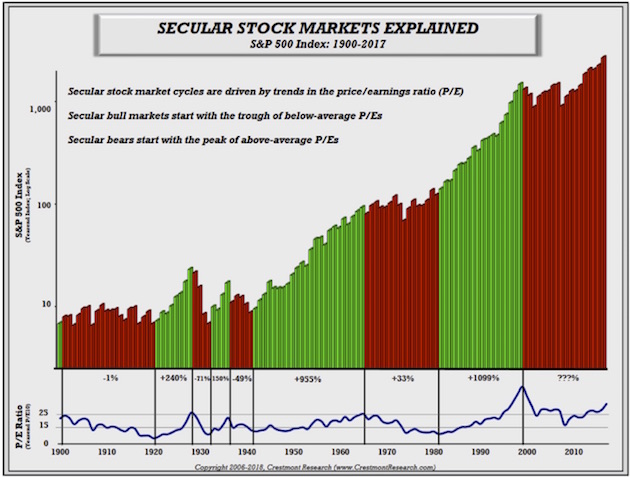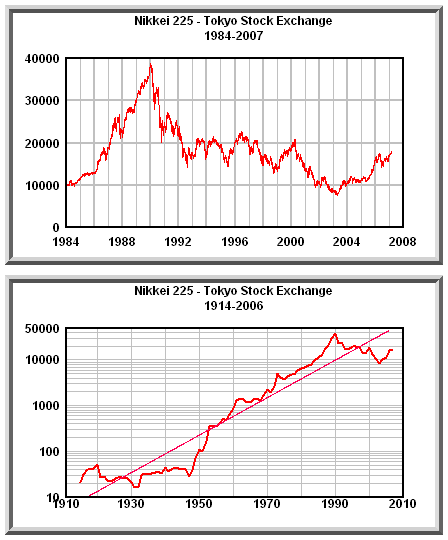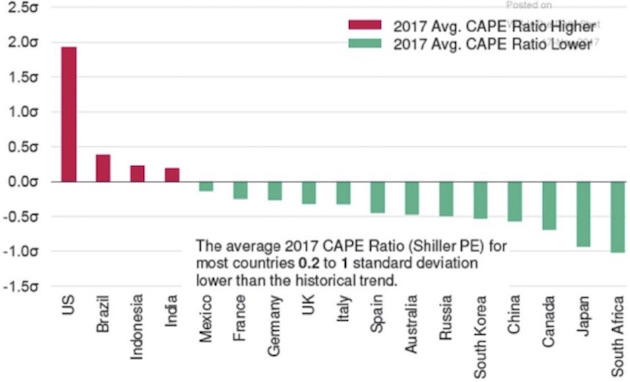Financial topics
Re: Financial topics
I wonder how Vince is coming with his plans to move his family into
some seagoing vessel (I forget what it's called), and live
indefinitely in the middle of the ocean?
some seagoing vessel (I forget what it's called), and live
indefinitely in the middle of the ocean?
-
Higgenbotham
- Posts: 8139
- Joined: Wed Sep 24, 2008 11:28 pm
Re: Financial topics
I bought the 2600 puts because it's cheap enough to stay about 7% under the average. I think the 2010 flash crash was about 10% from the 1100 level. I think if it happens from 2800 it will be at least 20%.John wrote:I'm not so sure. I would expect a "flash crash" of some kind, maybeHiggenbotham wrote: > Personally I think we can see 50% come off the stock indexes in
> 2-4 days.
> From the 1929 and 1987 tops it took about 2 months for the stock
> indexes to fall 50%. I believe it can happen an order of
> magnitude faster this time.
20%, with a quick recovery, followed by a long-term crash, as happened
in 1929.
While the periphery breaks down rather slowly at first, the capital cities of the hegemon should collapse suddenly and violently.
-
Higgenbotham
- Posts: 8139
- Joined: Wed Sep 24, 2008 11:28 pm
Re: Financial topics
The day of the flash crash (May 6, 2010):
High 1167
Low 1065
About 9%.
High 1167
Low 1065
About 9%.
While the periphery breaks down rather slowly at first, the capital cities of the hegemon should collapse suddenly and violently.
-
Higgenbotham
- Posts: 8139
- Joined: Wed Sep 24, 2008 11:28 pm
Re: Financial topics
I think he called it seasteading. 5 years ago I couldn't see doing what Vince was doing. Now here I am talking about moving to Namibia and buying puts. If the fishing off the coast of Anguilla is good, he might be able to con"Vince" me that Anguilla is the better choice.John wrote: I wonder how Vince is coming with his plans to move his family into
some seagoing vessel (I forget what it's called), and live
indefinitely in the middle of the ocean?
While the periphery breaks down rather slowly at first, the capital cities of the hegemon should collapse suddenly and violently.
Re: Financial topics
Today's column from Mauldin actually contains a historical graph of
the P/E ratio. Since such graphs are as scarce as hens' teeth in the
mainstream media, I took note.
http://www.mauldineconomics.com/frontli ... pus-part-2

http://ggc-mauldin-images.s3.amazonaws. ... 113-02.jpg
The article also compares today's stock market to Japan's stock market
of the 1980s. I wrote an article on that subject in 2007:
** Japan's real estate crash may finally end after 16 years
** http://www.generationaldynamics.com/pg/ ... tm#e070220
In that article, I included a couple of graphs of my own.

The above graph shows the Nikkei 225 Index -- Tokyo Stock Exchange --
1984-2007 and 1914-2007.
The TSE crashed in 1990 and kept falling for 13 years. That might
describe how a NY Stock Exchange crash today might fare.
In that article, I also imported a graph of Japan's nationwide land
prices, 1979-2004, from Mish Shedlock's blog:

We did have a real estate crash starting later in 2007, but it was
slowed by massive Fed money printing, flooding the market with
liquidity. Those who were following this stuff ten years ago will
recall that the Bank of Japan has been heavily criticized for not
printing enough money in the early 1990s, and the Fed did not make
that "mistake."
Another graph in the Mauldin article compares the US P/E ratio with
other countries:

I had thought that many global stock markets were in bubble territory,
but this graph shows that the US bubble is by far the worst.
the P/E ratio. Since such graphs are as scarce as hens' teeth in the
mainstream media, I took note.
http://www.mauldineconomics.com/frontli ... pus-part-2

http://ggc-mauldin-images.s3.amazonaws. ... 113-02.jpg
The article also compares today's stock market to Japan's stock market
of the 1980s. I wrote an article on that subject in 2007:
** Japan's real estate crash may finally end after 16 years
** http://www.generationaldynamics.com/pg/ ... tm#e070220
In that article, I included a couple of graphs of my own.

The above graph shows the Nikkei 225 Index -- Tokyo Stock Exchange --
1984-2007 and 1914-2007.
The TSE crashed in 1990 and kept falling for 13 years. That might
describe how a NY Stock Exchange crash today might fare.
In that article, I also imported a graph of Japan's nationwide land
prices, 1979-2004, from Mish Shedlock's blog:

We did have a real estate crash starting later in 2007, but it was
slowed by massive Fed money printing, flooding the market with
liquidity. Those who were following this stuff ten years ago will
recall that the Bank of Japan has been heavily criticized for not
printing enough money in the early 1990s, and the Fed did not make
that "mistake."
Another graph in the Mauldin article compares the US P/E ratio with
other countries:

I had thought that many global stock markets were in bubble territory,
but this graph shows that the US bubble is by far the worst.
-
Higgenbotham
- Posts: 8139
- Joined: Wed Sep 24, 2008 11:28 pm
Re: Financial topics
https://www.institutcoppet.org/2015/09/ ... e-canlorbeGrégoire Canlorbe: In his 2010 essay, The Genius of the Beast: A Radical Re-vision of Capitalism, Howard Bloom proposes a radically naturalistic approach of boom and bust cycles, according to which depressions and good times are a manifestation of “a cosmos Googling her potential” through our cyclical mass emotions.
“Our economic gurus, Howard Bloom writes, had given us the false sense that catastrophic crashes like the Great Depression of 1929 – 1939 would never happen again. Why? Economists had cracked the code of the business cycle. They had found the secrets that stopped slides from becoming nosedives. Their tools? Raising and lowering interest rates, and knowing how and when to become financial saviors–“lenders of last resort”… Would these techniques work? No way…
Because economic crashes are not the fault of bad guys. They are not the result of obscure things like credit instruments and subprime mortgages gone hog wild. They are built into our biology… They come from our emotions and our perceptions. They come from the way we feel and see. What’s more, [they] come from the bio-cycles we help make when we are part of a group. They come from the soul of a society…
Boom and bust cycles are not unique to human beings. They arose when life itself began 3.85 billion years ago. They showed themselves among our first ancestors, bacteria. Then they reappeared in every other beast that lives in flocks, swarms, colonies, crowds and herds. Why? Because boom and bust—the cycle of good times and depressions—performs a vital function for society. That purpose? Exploration, consolidation, and repurposing. Learning, thinking, and creating. Functioning as an evolutionary search engine. Operating as a secular genesis machine.”
As a firm believer in socionomics, which influence has this analysis exerted on your own thought? Are you in line with the Bloomian perspective on the emotional cycles underlying the fluctuations of human economies?
Roy Barzilai: I completely agree with Blooms’ analysis of the biologicals roots of the cyclical nature of social mood, which exhibits itself in the history of economics and financial markets. Bloom’s original line of thinking is exactly what is lacking in our contemporary academic culture and we must come to a much higher level of understanding of our complex nature than the reductionist approach which dominates the sciences today. The same process of evolution that creates the biological cycles of growth and decay, of thriving new species followed by mass extinctions, regulates the volatility of our cultural history, from periods of prosperity and growth to great depressions and wars of mass extermination.
While the periphery breaks down rather slowly at first, the capital cities of the hegemon should collapse suddenly and violently.
Re: Financial topics
The more capitalism creates wealth, the more it sows the seeds of its own destruction. - Karl Marx
-
FishbellykanakaDude
- Posts: 1313
- Joined: Tue Jan 09, 2018 8:07 pm
Re: Financial topics
And that's the way it's supposed to be, because "capitalism" is a "natural" (larger-than-human) thing. Capitalism is simply a very bad description of the process that is "ecology".John wrote:The more capitalism creates wealth, the more it sows the seeds of its own destruction. - Karl Marx
It's ultimate "purpose" is to "hone" the apex species to overcome the planetary (biotic) dependence on the "genocide" technique. Why? Because genocide is a necessary evil until it's not. Turning "evils" into "not evils" is what existence (the universe) is all about.
Do not fear destruction, fear those who would call for an end to destruction, as they will be drowned in the tide instead of surfing it, and will "insist" on taking you to the bottom with them.
OK,.. yeah,.. so what?
We live where we live when we live. Our "ecosystem" is presently "interesting" (in the Chinese sense). This is the "break up into self(ish)-sustainable small groups" phase of the tidal/weather cycle. The tide is going out and accelerating. The snows are starting to fall, but the trees are not bare just yet.
Very small but tough wins. There is still time to harvest "outflow" resources (those "dragged" toward you by the ebbing tide), but trade them ALL soon for a tough hide and a sharp knife.
"..well, DUH, Fishy!!!"
Yes, yes, quite right. The only thing I have to offer, really, is that I know that there will be future cycles on this shore, and that eventually (you've seen my estimates when) we (humanity) will "sync up with the ecology" and do the very hard but necessary things to break the genocidal cycle.
..and it doesn't matter a whit whether ANY of us is around to "teach" our descendants about any of this. It'll take longer for them to figure things out if they can't be taught, but not really that much longer.
See 'ya out on the great ocean, mā ka kai loa, and around it's edges! Stay small,.. stay fast,.. stay tough.
Nā pōmaikaʻi īa ʻoukou a me ʻe pili mau ke aloha a ka naʻauao me ʻoukou kehahi. Nā makani ʻoluʻolu!
-
Higgenbotham
- Posts: 8139
- Joined: Wed Sep 24, 2008 11:28 pm
Re: Financial topics
It could be that something unnatural to the environment is amplifying the current euphoria. Some suspects might be: blue light from LED screens, pharmaceuticals, endocrine disrupters, electromagnetic pollution, etc.
Right now I think the stock market is in an upcrash that may last a couple more days, ideally. However, it is currently stretched further than many technicians have ever seen it stretched by some measures. More Viagra may stretch it even further. Free Viagra for all financial services workers and stock market investors could extend it another week. I vote for less quantitative easing and more Viagra.
Cocaine was a great help to the 1987 bull and crash from what I was told.
Right now I think the stock market is in an upcrash that may last a couple more days, ideally. However, it is currently stretched further than many technicians have ever seen it stretched by some measures. More Viagra may stretch it even further. Free Viagra for all financial services workers and stock market investors could extend it another week. I vote for less quantitative easing and more Viagra.
Cocaine was a great help to the 1987 bull and crash from what I was told.
While the periphery breaks down rather slowly at first, the capital cities of the hegemon should collapse suddenly and violently.
Re: Financial topics
The unnatural thing that's amplifying the current euphoria is Trump.
Who is online
Users browsing this forum: Bing [Bot] and 1 guest